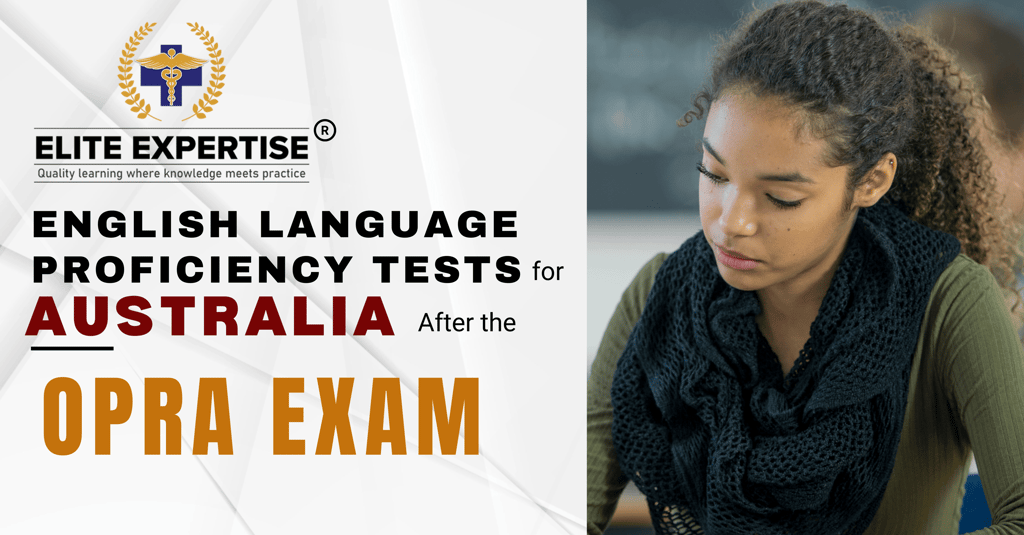ASK MY PHARMACIST | GOT QUESTIONS? Your pharmacist has answers. Click Here
English Language Proficiency Tests for Australia After the OPRA Exam
Clearing the OPRA exam is just one step toward becoming a licensed pharmacist or healthcare professional in Australia. Demonstrating English language proficiency through one of these accepted tests is equally crucial. Whether you choose IELTS, PTE Academic, OET, Cambridge, or TOEFL iBT, proper preparation can help you meet the required standards and ensure a smooth registration process.
Arief Mohammad
12/26/20242 min read


Introduction:
English Language Proficiency Tests for Australia After the OPRA Exam
Want to become a registered pharmacist in Australia then Australia, passing the OPRA exam is a significant milestone. Another important milestone after you clear the OPRA exam is proving yourself with the English language proficiency as the official language in Australia is English and is a mandate by the Australian Health Practitioner Regulation Agency (AHPRA). Here’s a guide to the accepted English language tests, their score requirements, and how they apply to various healthcare professions.
Accepted English Language Tests
Australia recognizes several English language tests for healthcare professionals, including:
1. Cambridge (C1 Advanced or C2 Proficiency)
2. IELTS (Academic)
3. OET (Occupational English Test)
4. PTE Academic (Pearson Test of English)
5. TOEFL iBT (Internet-Based Test)
Cambridge (C1 Advanced or C2 Proficiency)
This test is widely accepted for professions like pharmacy, medicine, dental etc.,
It's is a paper and computer given at the test centres only.
• Minimum Score requirement: Overall score: 185
Listening, Reading, Speaking: Minimum score of 185
Writing: Minimum score of 176
• Two Test Sittings (if needed):
A minimum score of 176 in all components.
IELTS (Academic)
The IELTS Academic test is one of the most popular options for pharmacists and other healthcare professionals.
• Minimum Requirements:
Overall score: 7
Listening, Reading, Speaking: Minimum score of 7
Writing: Minimum score of 6.5
• Two Test Sittings (if needed):
Minimum overall score of 7 with no component score below 6.5.
OET (Occupational English Test)
The OET is tailored for healthcare professionals, offering profession-specific testing.
• Minimum Requirements:
Listening, Reading, Speaking: Minimum score of B
Writing: Minimum score of C+
• Two Test Sittings (if needed):
No component score below C+.
PTE Academic (Pearson Test of English)
The PTE Academic is a computer-based test accepted for multiple healthcare professions.
• Minimum Requirements:
Overall score: 66
Listening, Reading, Speaking: Minimum score of 66
Writing: Minimum score of 56
• Two Test Sittings (if needed):
No communicative skill score below 56.
TOEFL iBT (Internet-Based Test)
TOEFL iBT is another widely accepted option for registration in Australia.
• Minimum Requirements:
Total score: 94
Listening, Reading, Writing: Minimum score of 24
Speaking: Minimum score of 23
• Two Test Sittings (if needed):
No score below:
Listening: 20
Reading: 19
Writing: 24
Speaking: 20
Choosing the Right Test
The choice of test depends on your familiarity with the format and your proficiency level. For instance:
• If you prefer a easy test specific to healthcare, PTE may be the best fit.
• For candidates comfortable with academic-style English, IELTS Academic or PTE Academic are excellent options.
• If you have experience with American English, TOEFL iBT might suit you.
Key Points to Remember
• You can take any of these tests in one sitting or split them into a maximum of two sittings within 12 months, provided minimum scores are met.
• Always aim to meet or exceed the minimum score requirements in all components.
Conclusion
Clearing the OPRA exam is just one step toward becoming a licensed pharmacist or healthcare professional in Australia. Demonstrating English language proficiency through one of these accepted tests is equally crucial. Whether you choose IELTS, PTE Academic, OET, Cambridge, or TOEFL iBT, proper preparation can help you meet the required standards and ensure a smooth registration process.
With the right planning and practice, you can achieve your goal of practicing in Australia with confidence!
Follow Us
+91 76750 84909
Privacy Policy | © 2025 Elite Expertise . All Rights Reserved.
ELITE EXPERTISE PTY. LTD (ABN: 15668292439) (ACN: 668292439)
Australian Statutory Education License: OPP 2025 ELITE EXPERTISE PTY. LTD
Disclaimer
Elite Expertise is an online education platform dedicated solely to providing coaching and preparation services for the OPRA, PEBC, PSI and PTE exams. We do not offer any sponsorship or migration services. All information provided on our platform is for educational purposes only and should not be interpreted as legal or immigration advice. For inquiries regarding sponsorship, visa applications, or migration services, please consult with licensed immigration professionals or relevant authorities.
Elite Expertise is a trusted and results-driven training platform specializing in preparation for international pharmacist licensing exams. Our comprehensive courses, expert instructors, and proven methodologies have helped countless pharmacy professionals achieve their goals and succeed in competitive regulatory exams. We are proud of our strong success rate and commitment to excellence.
Elite Expertise is an independent training provider. We are not affiliated with any global pharmacy regulatory authorities or official exam-conducting bodies.
Copyright © 2025 Elite Expertise. All rights reserved.
Address
Unit 1/73 Beverley St, Doncaster East VIC 3109, Australia
